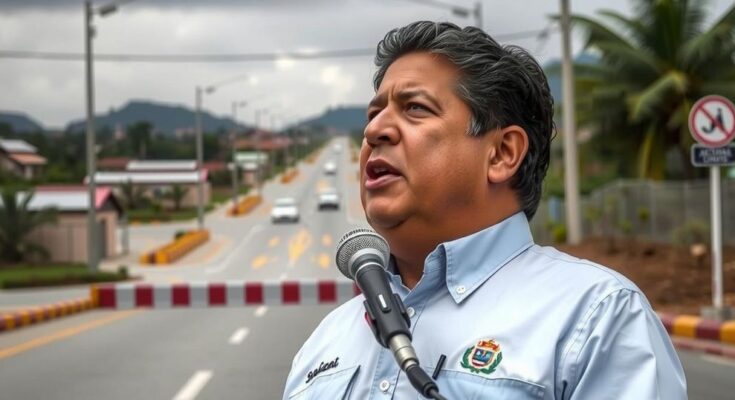Nicolás Maduro is about to begin his third term amid protests against his regime. María Corina Machado, a key opposition leader, faced harassment and brief detention, prompting international condemnation and the closure of the Colombia-Venezuela border. As political repression escalates, international leaders and human rights organizations voice serious concerns about the state of democracy in Venezuela. The situation could further destabilize as opposition groups rally against Maduro’s authoritarian rule.
Venezuela’s President Nicolás Maduro is set to take an oath for a third term amidst significant unrest and opposition protests. Following a demonstration led by opposition leader María Corina Machado, she was briefly detained, raising concerns about the Maduro government’s ongoing repression of dissent. The Colombian government condemned the treatment of Machado, citing acts of “systematic harassment.” In a protective measure ahead of the swearing-in, the Venezuelan state of Táchira closed its border with Colombia, a decision attributed to an alleged international plot to disrupt Venezuelan stability.
The political climate remains tense, as U.S. President-elect Donald Trump endorsed Machado as a “freedom fighter” and criticized Maduro’s regime. Trump’s administration had previously imposed sanctions on the Venezuelan government, a stance that may evolve with the new administration. Internationally, leaders from Ecuador to Spain have condemned the Maduro regime, highlighting concerns over the detention of political opponents and the violent crackdown on protests.
International oversight bodies have raised alarms over the arrests and violent repression observed in the lead-up to Maduro’s inauguration. Reports indicate numerous casualties and detentions among protesters, reflecting an oppressive state response to public dissent. Meanwhile, Maduro retains support from allies, including Russia and Cuba, bolstered by a loyal military and established political structures allowing him to maintain power despite widespread allegations of electoral fraud.
Machado and fellow opposition figures continue to galvanize their supporters against Maduro’s oppressive tactics. With Maduro’s return to office imminent, the political tumult is likely to escalate, prompting further protests and calls for international intervention to restore democratic governance in Venezuela.
This article highlights the current political situation in Venezuela, focusing on President Nicolás Maduro’s impending swearing-in for a third term. The backdrop includes a history of contested elections, allegations of electoral fraud, and the subsequent suppression of dissent. The recent protests by the opposition, particularly those led by María Corina Machado, reflect the growing unrest among Venezuelans, exacerbated by the economic collapse and diminishing freedoms. The reactions of neighboring countries, the United States, and international organizations underscore the serious implications of consolidating power amidst widespread unrest.
In summary, as Nicolás Maduro prepares for his third term in office, the atmosphere in Venezuela is marked by heightened tension, widespread protests, and significant international condemnation of the repressive measures employed by his government. The ongoing struggle led by opposition figures like María Corina Machado symbolizes the urgent call for democratic change in a nation grappling with severe socio-political and economic crises. With the closure of the Colombian border and international scrutiny intensifying, the prospects for a peaceful resolution remain uncertain as Venezuela stands at a critical juncture.
Original Source: www.lemonde.fr




